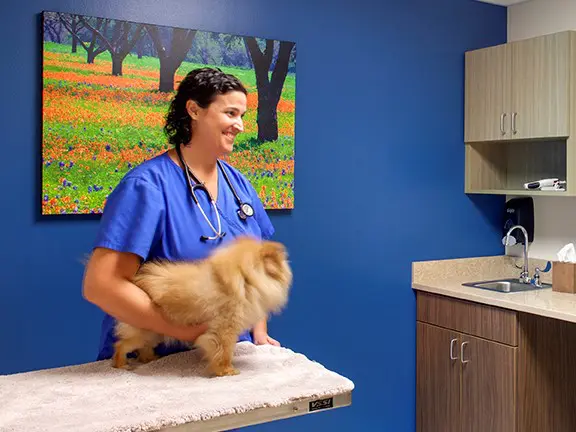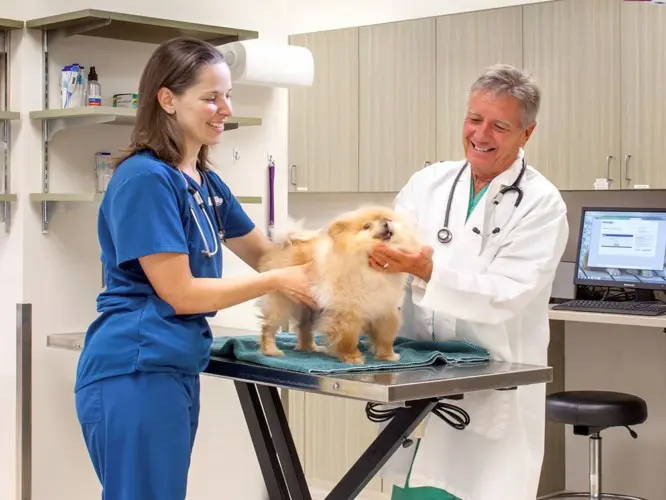At Austin Veterinary Emergency and Specialty Center, our team is available 24 hours per day, 7 days per week, to treat pet emergencies. Sometimes it is difficult to know if your pet requires emergency care, but if in doubt, always have your pet seen immediately by your family veterinarian or at an emergency facility.
Learn to recognize the following signs and conditions in your pet that signal emergency situations and require immediate veterinary assessment and treatment:
- Difficulty breathing — If your pet is struggling to breathe, she may not be taking in enough air to supply her body with oxygen. Dyspnea, or difficulty breathing, is always an emergency, since oxygen deficiency can quickly become life-threatening. Your pet needs immediate attention if she displays any of the following signs:
- Shallow breathing
- Increased respiratory rate (i.e., above 32 breaths per minute for a dog; above 42 breaths per minute for a cat)
- Wheezing or raspy sounds while breathing
- Increased effort to breathe, often accompanied by excessive thoracic or abdominal movement
- Pale or blue mucous membranes, which can be assessed by looking at the gum

- Allergic reaction — Allergic reactions occur most commonly in response to bug bites, medications, and vaccines. Allergic pets can quickly develop hives, facial or throat swelling, vomiting, and loss of consciousness. An allergic reaction can interfere with breathing and, in severe situations, cause death.
- Toxin exposure — If your pet has ingested a potential toxin, don’t wait for clinical signs to develop. Antidotes are available for only a few toxins, and most cannot be removed from the body once absorbed. According to the American Society for the Prevention of Cruelty to Animals (ASPCA), the most common pet toxins are:
- Over-the-counter medications
- Human prescription medications
- Toxic foods, including chocolate, grapes, raisins, xylitol, onions, and garlic
- Prescription veterinary products
- Household items, such as cleaning products, paint, and glue
- Rodent baits
- Insecticides
- Plants, including lilies, kalanchoe, sago palm, autumn crocus, azalea, cyclamen, oleander, dieffenbachia, daffodils, tulips, and hyacinths
- Garden products, such as fertilizers, compost, and herbicides
Before going to the clinic, call your veterinarian to see if you should induce vomiting at home to eliminate the toxin. Never induce vomiting without veterinary guidance, as some materials should not be vomited.
- Inability to stand or walk — A pet with sudden mobility loss should always be examined immediately. Although bone and ligament injuries can interfere with walking ability, paralysis is often caused by neurologic damage, which is serious. Most paralysis cases are caused by compression, herniation, or injury to the spinal cord. The length of time it takes to obtain treatment is a critical factor in these cases, and veterinary care should be sought immediately.
- Excessive bleeding — Apply constant pressure with gauze or a clean towel to an actively bleeding injury. If bleeding doesn’t stop in five minutes, keep pressure on the wound and transport your pet to a veterinarian immediately.
- Inability to urinate — Pets who are “blocked,” or unable to urinate, often strain, vocalize, repeatedly attempt to urinate, and are uncomfortable. A urethral obstruction causes life-threatening electrolyte imbalances, accumulation of toxic waste products in the blood, and risk of bladder rupture within hours. Immediate treatment is required to unobstruct the urethra and flush toxins from the body.
- Distended or bloated abdomen — Gastric dilation volvulus (GDV) is a life-threatening gas distension of the stomach, which has twisted on its axis, compromising blood flow to the stomach that may cause tissue death and shock. Affected pets often try repeatedly to vomit and are in obvious distress. Without immediate surgical correction, GDV is fatal.
- Vomiting or diarrhea containing blood — While a faint tinge of blood in the feces or vomit does not constitute an emergency, a significant amount of fresh, red blood can indicate hemorrhagic gastroenteritis (HGE). Blood loss from HGE can cause severe dehydration and shock, and pets may need intravenous fluids and blood transfusions to recover.
- Seizures — Immediate medical care is warranted if a seizure is your pet’s first, lasts longer than three minutes, or is one of several in 24 hours, called cluster seizures. A seizure can be a sign of toxicity that requires emergency decontamination. Status epilepticus, or continuous seizure activity lasting longer than a few minutes, can cause irreversible neurologic damage or death if not treated quickly.
- Trauma — Pets who experience a trauma, such as being hit by a car or another blunt force, or falling from an elevated surface, should be examined immediately. Your pet may not appear hurt, but internal bleeding or neurologic damage may not be immediately apparent.

- Penetrating wound — A bite, stab wound, gun shot, or other penetrating wound often requires antibiotic treatment to avoid infection. If the wound communicates with the thoracic cavity, air will surround the lungs and make breathing difficult. A wound that enters the abdominal cavity can cause peritonitis or abdominal infection.
- Heat exhaustion — Prolonged exposure to high temperatures and humidity can cause overheating, or heat exhaustion. Signs of heat exhaustion include:
- Excessive panting
- Difficulty breathing
- Pale gums
- Vomiting
- Diarrhea
- Disorientation
- Collapse
- Seizure
If your pet exhibits mild heat exhaustion signs, such as panting and disorientation, take her inside, offer her a drink of cool water, and apply towels soaked in cool water to her body. If she does not improve in 10 minutes, seek immediate veterinary care.
Do not delay if you decide your pet needs emergency care. Call us on the way with information about your pet’s status so our team can be ready when you arrive.
If you have questions about whether your pet needs emergency care, call us at 512-343-2837.
- Bacterial Meningitis – by Tracy Sutton, DVM, DACVIM - January 29, 2024
- November Oncology Continuing Education - October 10, 2023
- July Member Meeting & CE – Speaker: Jeremy Fleming - July 7, 2023
